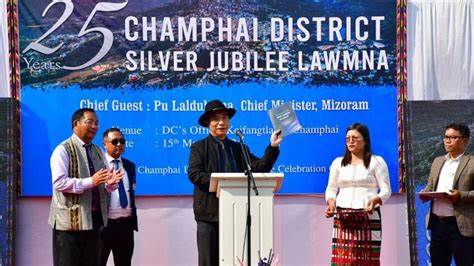In a poignant reflection on historical borders and their ramifications, the Chief Minister of Mizoram, a northeastern state of India, has raised poignant concerns over the demarcation of the India-Myanmar border. The Chief Minister’s remarks shed light on the complex legacy of colonialism and its enduring impact on regional geopolitics, underscoring the need for a nuanced understanding of historical borders and their implications for contemporary governance and identity.
Mizoram, nestled in the verdant hills of northeastern India, shares a border with Myanmar, formerly known as Burma. The region’s intricate history is intertwined with the legacy of British colonial rule, which left an indelible mark on the socio-political landscape of the Indian subcontinent.
In recent remarks, the Chief Minister of Mizoram has criticized the historical demarcation of the India-Myanmar border, characterizing it as a colonial ploy to divide indigenous communities and disrupt longstanding socio-cultural ties. The border, a product of colonial cartography, has had profound implications for the people inhabiting the region, shaping their identities and socio-economic interactions.
The Chief Minister’s comments resonate with a growing awareness of the legacy of colonialism and its impact on contemporary geopolitics. The arbitrary drawing of borders by colonial powers often disregarded existing social, cultural, and historical ties, leading to enduring tensions and conflicts in post-colonial contexts.
Historically, the British Empire sought to assert control over vast territories across Asia, employing divide-and-rule strategies to consolidate power and maintain dominance. The demarcation of borders, often based on expedient considerations rather than genuine respect for local identities and aspirations, has left a legacy of division and discord in its wake.
In the case of Mizoram and its border with Myanmar, the Chief Minister’s remarks highlight the enduring consequences of colonial-era border demarcation. Communities that once enjoyed close ties and shared histories find themselves divided by geopolitical boundaries, complicating issues of governance, identity, and socio-economic development.
Moreover, the Chief Minister’s critique underscores the need for a more inclusive and participatory approach to border governance and management. Rather than viewing borders as static lines on a map, policymakers and stakeholders must recognize them as dynamic spaces where diverse communities interact and negotiate their identities and interests.
The historical context of border demarcation in Mizoram also raises broader questions about sovereignty, territoriality, and self-determination. Indigenous communities in the region have long asserted their rights to autonomy and self-governance, seeking recognition of their distinct identities and aspirations within the framework of the Indian state.
The Chief Minister’s remarks come at a time of heightened awareness of indigenous rights and decolonization movements across the globe. In Mizoram and other northeastern states of India, indigenous communities are increasingly asserting their agency and demanding greater recognition of their cultural, political, and economic rights.
In light of these developments, the Chief Minister’s critique of the historical India-Myanmar border demarcation underscores the need for a more nuanced and inclusive approach to border governance. Rather than perpetuating colonial legacies of division and discord, policymakers must work towards fostering dialogue, reconciliation, and cooperation across borders, respecting the diverse identities and aspirations of borderland communities.
Moving forward, the Chief Minister’s remarks serve as a call to action for policymakers, scholars, and civil society actors to critically examine the legacy of colonialism and its impact on contemporary border dynamics. By acknowledging the historical injustices and inequalities embedded in colonial-era border demarcations, we can begin to chart a path towards more inclusive and equitable border governance that respects the rights and dignity of all affected communities.
In addition, the Chief Minister of Mizoram’s critique of the historical India-Myanmar border demarcation underscores the enduring legacy of colonialism and its impact on contemporary border dynamics. By calling attention to the historical injustices embedded in colonial-era border policies, the Chief Minister highlights the need for a more inclusive and participatory approach to border governance that respects the rights and aspirations of all affected communities.


